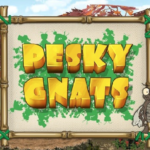
A look through the digital health blogs on our sister blog (the Mental Elf) shows a wide variety of technology-supported interventions exist: ranging from smartphone applications and interactive internet-delivered interventions to offline computer programmes intended to inform, prevent or treat symptoms of (mental) health problems in children and adults. However, people with learning disabilities were generally absent from these studies as they were excluded either explicitly by the studies’ participant criteria or implicitly through the studies’ recruitment strategies.
Breaking new ground, Cooney et al. decided to use a computer programme with adults with learning disabilities to support psychological therapy. Rather than develop a new intervention, they adapted Pesky gNATs, a programme used to support and supplement cognitive behavioural therapy (CBT) with children and adolescents.
For the first published study in this area (computer-based mental health interventions for people with learning disabilities) the researchers were interested in finding out:
- Whether people with learning disabilities could use the adapted Pesky gNATs computer game;
- Whether its use could improve symptoms of depression and/or anxiety.
Methods
Participants
Although the original Pesky gNATs intervention was developed for use with children and adolescents, the authors piloted the adapted intervention with adults with learning disabilities only. Participation in the study was further limited to people with mild to moderate learning disabilities who were expected to have the skills required to engage with the computer game. All participants presented with a diagnosis of present or recurring anxiety and/or depression.
Design
In total, 52 participants were randomised to receive either the computer game intervention (N = 26) or treatment as usual (TAU; N = 26). The researchers assessed symptoms of depression and anxiety at the start and end of the 7-week intervention, and again 3 months after completing the intervention.
Intervention
Participants played Pesky gNATs: The Feel Good Island, a computer game designed to introduce people with learning disabilities to the core principles of CBT. The intervention used gamification techniques (different levels and characters, 3D game world …) to teach CBT skills, in addition to presenting mindfulness and relaxation exercises. Clinical psychologists supported participants in using the game during weekly 1-hour therapy sessions and to complete the accompanying workbook at home between sessions. The workbook served as a non-digital reminder of the games’ contents and exercises for each week.
In the control group, participants continued to receive TAU. For some participants this included pharmacological therapy for anxiety and mood disorders, whereas others continued to receive support counselling or cognitive behavioural therapy for symptoms other than anxiety and mood disorders.
Results
Anxiety symptoms, in particular worries and physiological symptoms, of people in the intervention group decreased following treatment and continued to decrease up to three months follow-up. The intervention had no effect on specific phobias. In terms of clinical significance, the authors assessed how many people were in remission following the intervention. For the treatment group, the anxiety scores of 7 people moved from the clinical to the non-clinical range. A further two participants were in remission at the 3-month follow-up assessment. For the TAU group, these were respectively one and two participants in remission at the end and three months post the intervention.
The CBT computer game did not improve depressive symptoms or general psychological wellness when compared to the TAU group.
If symptoms of depression did not improve, did some participants deteriorate? The analyses did not show the intervention to have any negative or harmful effects.

Anxiety symptoms of people in the Pesky gNATs group decreased following treatment and continued to decrease up to 3 months follow-up.
Discussion
This study was the first of its kind to evaluate computerised CBT for people with learning disabilities who experience anxiety and/or depression. It may open a new field of research and poses lots of exciting new research questions.
The randomised controlled trial design they used allows us to investigate the causality between the intervention and the outcomes. One drawback in this respect is that the researcher administering the assessments was not blinded and therefore potentially biased in recording the outcomes.
As the first application of a new intervention, the study had a small sample size recruited through a single organisation. The findings may therefore be not representative of the wider group of people with learning disabilities. The sample size also limited the types of analyses the researcher could perform. Hence, there is no information regarding whether, which or how participant characteristics might impact upon engagement with either the intervention or its outcomes.
Instead of only reporting the statistical significance of findings, the authors also paid attention to their clinical importance by investigating remission rates. Following the trail of clinical and economic impact, future steps could be to establish the numbers needed to treat and to perform a cost-benefit analysis.

This is a small trial, but the results may pave the way for more work in this field.
Strengths and limitations
A definite strength of the study is that four people with learning disabilities were involved in developed the CBT computer game to ensure its user friendliness. The development process is not described in this paper, but it might be useful to know more about what changes the people with learning disabilities suggested and which adaptations to the original version were not received well.
The computer game focused on CBT skills and exercise that could be applied to people who experience anxiety, depression, or both. Despite this transdiagnostic approach, only people with anxiety seemed to benefit from the treatment. This is in contrast with another RCT of transdiagnostic individual CBT that only reported improvements for adults with depression or with co-morbid depression and anxiety, but not for those with anxiety alone (Hassiotis, et al., 2013). More research is needed to determine the active components of such transdiagnostic approaches and their relative impact for all three patient groups (anxiety alone, depression alone, anxiety and depression).
Finally, the study uses a naturalistic design in that people in the control group could continue treatment as usual. As some people in this group received cognitive behavioural treatments (e.g. a CBT-based anger management intervention) and other psychological interventions, it is not clear how each intervention may have impacted upon the individuals’ anxiety and depression symptoms and whether this accounted for a lack of a treatment effect on depression ratings. Given the small sample size, however, this could not be analysed.
Conclusions
Can adults with learning disabilities use a CBT computer game?
The study shows that people with learning disabilities can play a CBT computer game when used in therapy with a clinical psychologist.
Can a CBT computer game reduce symptoms of anxiety and depression in people with learning disabilities?
Playing Pesky gNATs: The Feel Good Island reduced symptoms of anxiety in people with learning disabilities up to the point of remission. The CBT computer game had no effect on symptoms of depression.

Are serious games a promising way to help people with learning disabilities?
Links
Primary paper
Cooney P, Jackman C, Coyle D, Reilly GO. (2017) Computerised cognitive-behavioural therapy for adults with intellectual disability : randomised controlled trial.
Other references
Hassiotis A, Serfaty M, Azam K, Strydom A, Blizard R, Romeo R, King M. (2013) Manualised Individual Cognitive Behavioural Therapy for mood disorders in people with mild to moderate intellectual disability: a feasibility randomised controlled trial. Journal of Affective Disorders, 151(1), 186–95. http://doi.org/10.1016/j.jad.2013.05.076
Photo credits
CC BY 2.0
CC BY 2.0
CC BY 2.0
Photo by William Iven on Unsplash

[…] Read the review here. […]
[…] Computer games to support psychological therapy (see my previous blog on computerised cognitive behavioural therapy using Pesky gNATs: The feel good …) […]